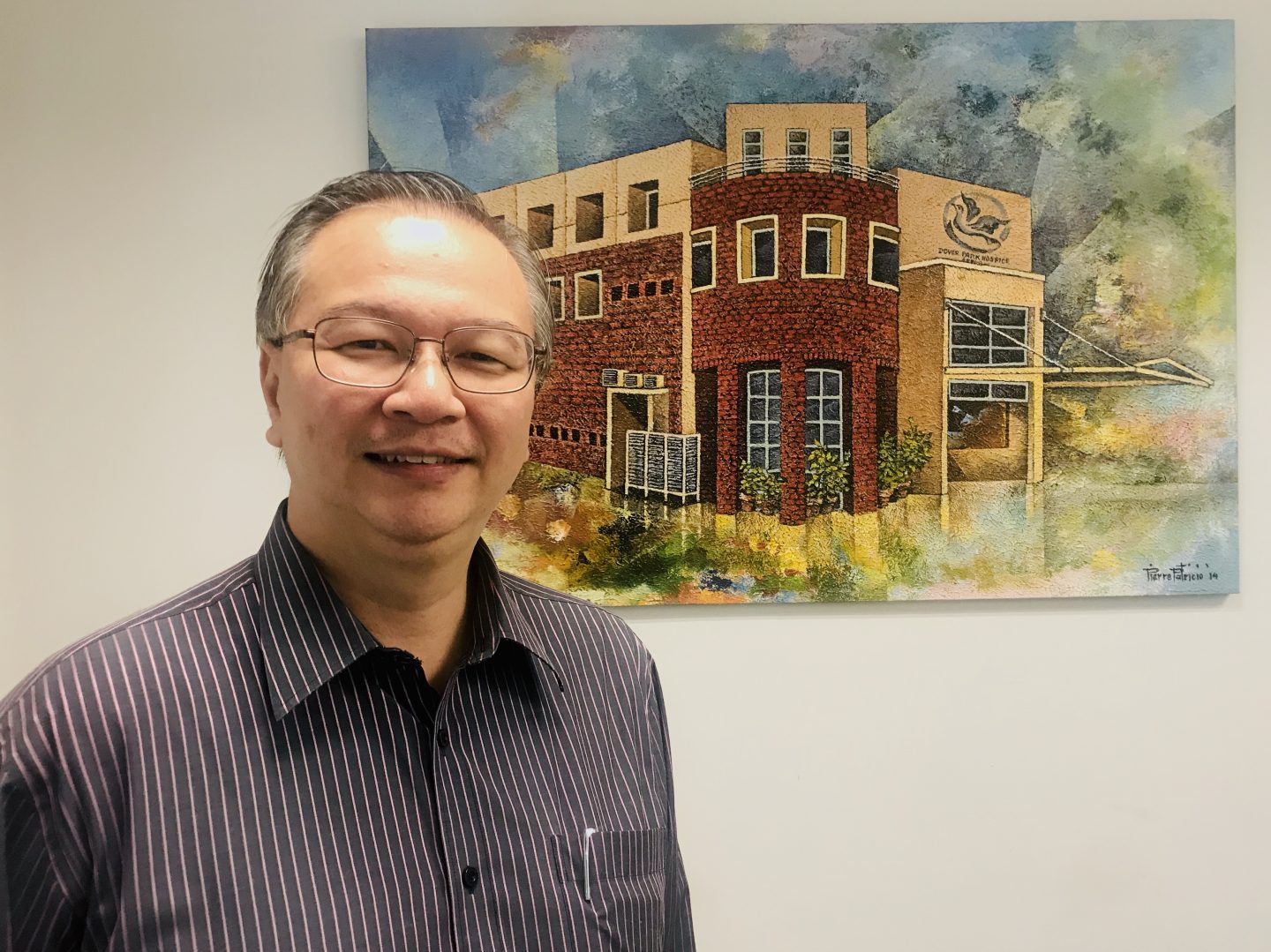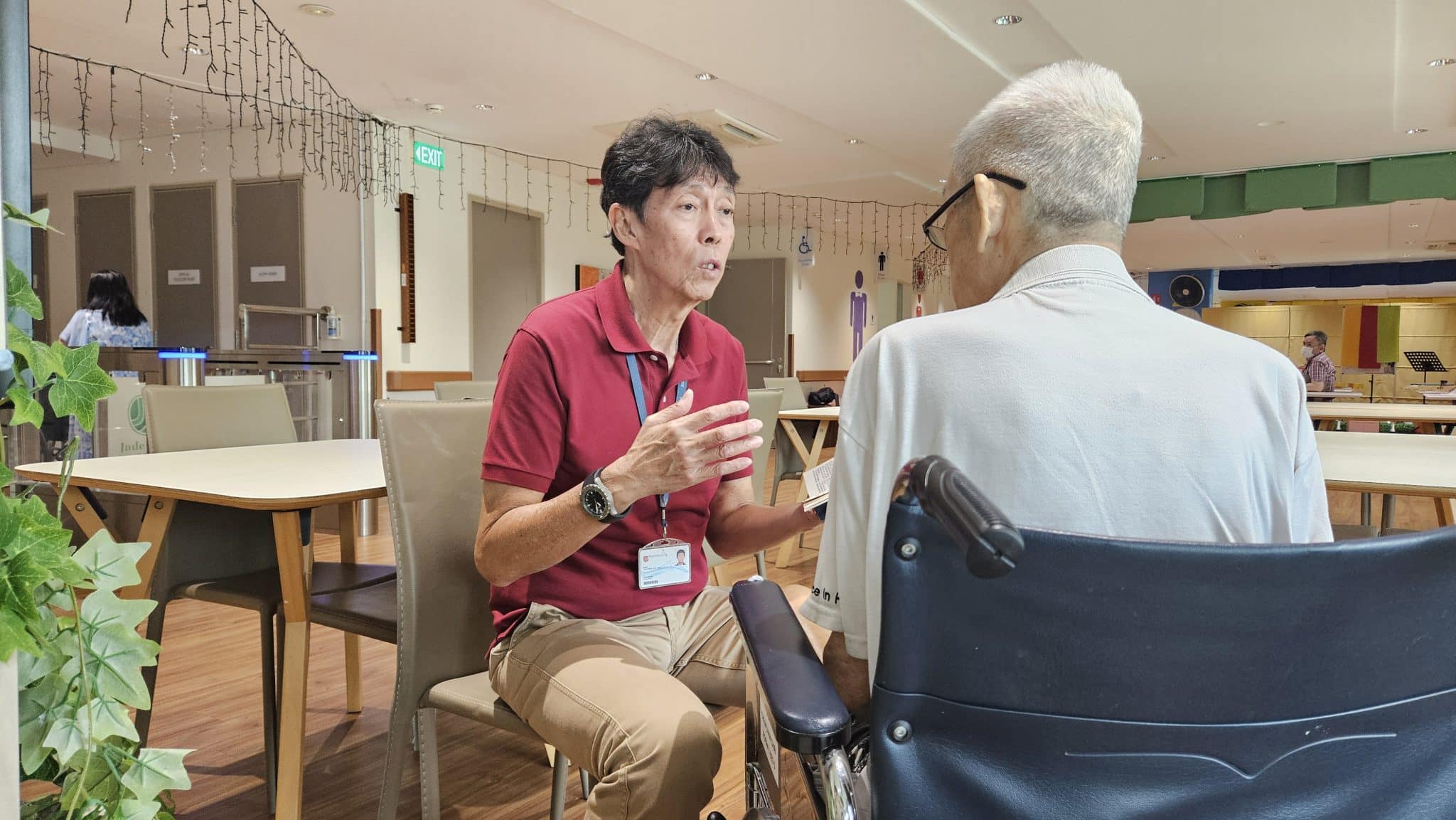It’s never too early to plan your funeral: Dover Park Hospice CEO Timothy Liu
by Rachel Phua // October 13, 2019, 6:00 am

Through his work, Dover Park Hospice CEO Timothy Liu says things that seemed so important in his younger days are no longer significant as he grows older. Photo by Rachel Phua.
Before joining Dover Park Hospice as its chief executive officer, Timothy Liu had to look up what a hospice was exactly, he admits.
The 47-year-old was previously always in the engineering industry but left after his frequent business trips took a toll on his family – particularly his wife, who had to take care of their children and his elderly parents. After six months of hunting for a job, he landed in his current role through a friend’s recommendation.
Now, slightly over three-and-a-half years into the post, Liu is no longer a greenhorn in the healthcare industry.
Under his helm, the hospice opened the Palliative Care Centre for Excellence in Research and Education together with Nanyang Technological University’s Lee Kong Chian School of Medicine and the National Healthcare Group last year. The centre, housed within the hospice, conducts research and provides training on delivering palliative care to patients with cancer, end-stage organ failure and dementia.
Each person, no matter how frail, how unproductive they may be, still reflects the image of God.
In April, the hospice also started a day-care service in addition to home-care and in-patient services. It will be officially launched this month.
For someone who is surrounded by the dying, Liu is no stranger to the topic of mortality. Through his work at the hospice, Liu says that he’s learnt from the patients how things that seemed so important in his younger days are no longer significant as he grows older. “You find what is truly meaningful,” he muses.
None of the patients say “oh, I didn’t earn enough money” or “I didn’t chase after whatever thing I was doing”, Liu points out. Instead, the regret always revolves around family: “I didn’t spend enough time with my family” or “I long to see the daughter I lost touch with”.
Even simple gifts of life become magnified. Once, Liu saw a patient along the corridor and asked him why he was sitting outside. The patient responded that it felt good to be under the sun and perspiring – he hadn’t broken a sweat in weeks, and felt “alive” when he was sweating.
No one’s useless
Running a hospice has also taught Liu that it is necessary to empower the elderly. Just because they are at a hospice doesn’t mean they are waiting to die, he says. They still want to do take charge of their current situation.
One patient who wanted to help pay for his stay was happy to just fold paper cranes and have the hospice sell them online. Another patient who was paralysed from neck down would write articles about her experience using her eyes, facing a tablet.
“It comes back to us giving them a purpose.”
Unfortunately in Singapore, he adds, people are valued as a production unit. Once a person is no longer economically viable, they become a liability.
Yet, God’s view of people is different. Each person, no matter how frail, how unproductive they may be, still reflects the image of God. The patient is still someone’s mum, dad, husband, wife – someone you love “for who they are, not for what they can offer”.
“What we’ve tried to do is to create these realities so that they don’t feel like they are just waiting to die,” Liu explains. “It comes back to us giving them a purpose and dignity according to Imago Dei (Latin for ‘image of God’).”
Death is not the end
Death is a topic Liu doesn’t shy away from, especially given that it’s something “you can’t run away from”. In fact, when he was 20 years old, he had already planned how his funeral would go, he says. And he thinks the rest of society should do the same. For one, it’s pretty liberating.
“Once you’re settled with what’s ahead, you have the freedom to be engaged in the present,” he says. Then you can live life envisioning how “the end is going to be like”.
And rather than seeing the subject as taboo, talking about death would lessen any potential friction among the family members if the parent or elder discussed it beforehand, he believes.
God’s redemption is, and will be, beyond our imagination.
Given how much forethought he’s given to his last days, would Liu have any regrets on his deathbed then? For sure, he says, except he doesn’t know what they are yet. Right now, he’s just doing his best with whatever knowledge he has but he also understands how hindsight chastises.
Knowing that all things will be made perfect in heaven (1 John 3:2) has, to an extent, shed his anxieties about the future. Whether it’s through the Bible or the present, God has shown that “He redeems everything that has gone wrong”.
Liu uses the story of the Tower of Babel as an example. Because the population rebelled, God cast judgement on them. From that generation on, humankind was scattered throughout the world, with different languages (Genesis 11:9).
But in Revelation, John writes that the kings of the earth – each of them has their own cultures and languages – bring glory into heaven (Revelation 21:24;26). It’s a redemption of what happened at the Tower of Babel.
God’s redemption is, and will be, beyond our imagination, Liu concludes. Swords will be turned to plowshares (Isaiah 2:4). Things that were intended for evil “will be transformed for good (Genesis 50:20)”. And so would death.
We are an independent, non-profit organisation that relies on the generosity of our readers, such as yourself, to continue serving the kingdom. Every dollar donated goes directly back into our editorial coverage.
Would you consider partnering with us in our kingdom work by supporting us financially, either as a one-off donation, or a recurring pledge?
Support Salt&Light



